Today SevenPonds is speaking with Gaby Donnell, Licensed Clinical Social Worker and co-founder of Motheroots Counseling, based in Portland, Oregon. Motheroots provides counseling services to adults in their childbearing years, helping them deal with issues around fertility, loss of pregnancy, death of a child, postpartum depression, maintaining healthy adult relationships and parenting approaches.
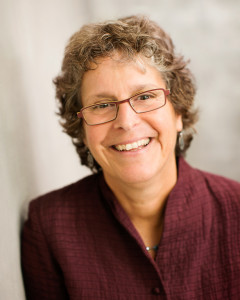
Gaby Donnell
(Credit: campbellsalgado.com)
Juniper: Motheroots provides counseling throughout the journey of conception, pregnancy, childbirth, and postpartum adjustment. How did you get your start in this field?
Gaby: Prior to starting Motheroots, I worked primarily as a play therapist with children who had been abused or in domestic violence situations. When I was pregnant, I began seeking out supportive resources for new parents, and all I could find was a prenatal yoga class. I was studying and using the sand tray method at the time, and I began researching the training I would need to work with people during the childbearing years. I met Winnie Davis, a woman here in Portland, who started an organization called Baby Blues Connection. She is a psychologist who had postpartum depression — her website is called Postpartum Support International. It provides training around postpartum issues to social workers, counselors and doctors.
I started Motheroots in 1996. One of my first clients was a couple whose baby died at 28 weeks, and they were my first teachers in dealing with infant loss. Although I’d worked with grief, this was new to me.
Juniper: Can you tell me a little more about Baby Blues Connection — how it affected your professional development?
Baby Blues Connection is a local group that provides services and training to postpartum women who have anxiety and depression. My work with them includes providing free training around issues related to pregnancy, postpartum, loss and fertility. It’s a great support for people who seek a group to accept and support them through the challenges — as much as the joys — of parenting.
Juniper: At Motheroots, you address not only prepartum anxiety and postpartum depression, but also fertility issues, loss of pregnancy, and stillbirth. In what situations might your clients require a facilitated grieving process across the related topics that you specialize in?
Gaby: Let’s begin with the most observable trauma: stillbirth — grieving the loss of a child you won’t get to raise, and the trauma of sudden death. Not everyone seeks out counseling assistance during this time, but the ones who do have found it helpful. Part of what Motheroots does is refer clients to other organizations that provide ongoing support.
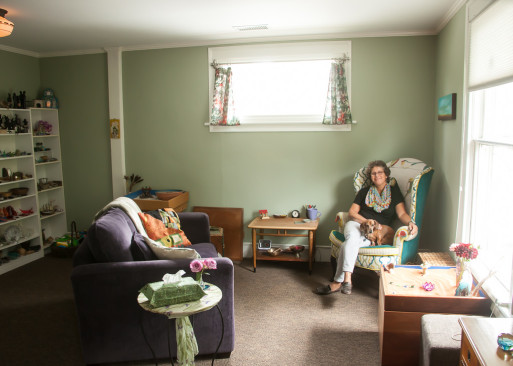
Gaby in her element at Motheroots
(Credit: campbellsalgado.com)
Juniper: What about grieving processes related to a parent’s or hopeful parent’s own childhood trauma? Do you provide counseling regarding how this would affect an individual’s parenting approach?
Gaby: Yes. People often seek us out because they grew up in a dysfunctional family environment or because they experienced sexual or physical abuse. They want to provide a loving, caring environment for their child, but find that they don’t have the skills from their own upbringing to navigate that. We help individuals live the values they have established, and then actualize the ways in which they want to raise their children.
Part of that process is addressing reactive ways of responding to outer stimuli. For example, if someone was raised in a very strict environment, their tendency may be toward embodying the opposite instead of approaching parenting from a place of balance and guidance. This can be difficult for anyone whose upbringing was extreme in one way or the other.
Juniper: When you are working with childhood trauma in adults, do you ever work back more than one generation to address ancestral trauma?
Gaby: Absolutely. Sometimes that’s conscious and sometimes not. There’s an interesting body of literature that is currently growing, called epigenetics. Sometimes (I think, all the time) our experiences change our genetic makeup. That is, trauma, as well as experiences that are nourishing, replenishing and healing, change our genetics. Some of these early habits of mind and behavior go back to our cultural histories, and when we address those things, we change our culture.
It’s like the evolution of dropping a tail that we no longer need. When we drop habits that no longer serve us — habits around responding to fear, for example — we can stop causing harm to ourselves and others through these unconscious reactions that are no longer serving us.

Sand tray therapy
(Credit: meredithkrugellcsw.com)
Juniper: What are some approaches or helpful ideas you might employ to guide an individual in shifting from the grief of pregnancy or infant loss into openness toward a new pregnancy or adoption, given that this is the client’s ultimate goal?
Gaby: First, I have to say that everyone navigates grief in different ways, and people are so different. I listen for what has been a guide for someone in the past, whether that is a religious or spiritual practice, making art or being in nature. These things can be anchors to help us move forward with more ease and less suffering. Sand tray, for example, is a technique in which a person can step back and look at the larger picture of what’s happening, using symbolic, tangible items that have particular meaning to them. For example, a toy tiger can mean a million different things to a million different people, but when someone chooses to ascribe a particular meaning to it for the purpose of working with a sand tray, that item represents something very personal for them in relation to the other items there.
We can get stuck in our trauma by not seeing the whole of the situation, such as when a child dies and the parent is devastated, but may not realize that there is still an underlying desire to have another child. Alternatively, we can get so attached to what we believe we want that we lose touch with our authentic desires. When we use mindfulness techniques like sand tray or art or being in nature, it allows for our natural wisdom and insight to come through in our awareness, and we will be more satisfied with our lives.
When a grieving parent is dealing with a subsequent pregnancy, my recommendation is that they not “white knuckle it,” but rather meet this as a new experience. We do a lot of work around that.
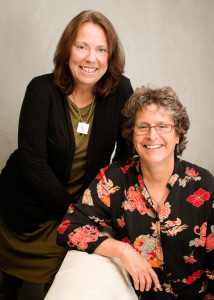
Juniper: Could you share with our readers a short mindfulness practice you would use with a client?
Gaby: For some people, just sitting still and taking a few breaths is all they can tolerate or all they need to ground themselves. For others, it’s having a regular daily practice of walking or writing, for example, to give them a container in which they can experience their truth in a private and less overwhelming way.
Some people come into my office and just need to slow down, so I invite them to feel into their body as they sit — to feel their hands on their lap; to feel their feet going into the earth; and ultimately to put a hand over their heart and feel compassion for their own experience. This is a powerful yet generic practice that may look slightly different depending on who is in front of me. There’s compelling research out now showing that self-compassion, especially in times of suffering, is very wholesome and nurturing for our brains and general well being.
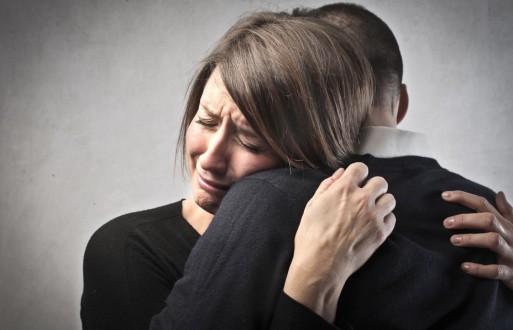
Credit: steadyhealth.com
Juniper: You also help individuals and couples relate to themselves and each other in the postpartum phase. What are some issues that come up after the birth of a child, particularly for those parents who have experienced pregnancy or infant loss in the past?
Gaby: There’s a lot of literature about how infertility or loss can be problematic for a romantic partnership because it’s such a high-stress situation. In my experience, those are the times I’ll usually see people as a couple. We focus on how people grieve and navigate infertility, and practice being patient with one another — finding a place in the middle.
I see a skewed population because the people I see are those who have chosen to come to counseling. But, of the people I have worked with, I’ve seen an incredible amount of care and love that comes out of situations like infertility or a child dying. A relationship can deepen through communication, rituals that are mutually meaningful and binding and finding ways to support each other. I don’t look at grief pathologically, but rather as an opportunity to really be there for each other, even though you may be needing different things.
Take a recent example from my practice: A couple had a child die, and the father wanted to sue — he was really angry. The woman was more focused on getting pregnant again as soon as possible. This is a situation in which there could be big conflict in their marriage. Being able to hear each other’s perspective helped them to see that they were both coming from an experience of grief, and that allowed them to not be angry with each other.
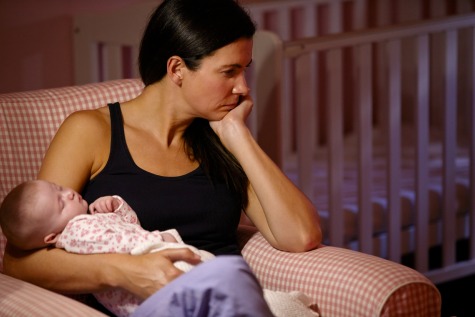
Mother suffering from postpartum depression
(Credit: patheos.com)
Juniper: Can you speak to the complex situations and emotions that come up around abortion/intentional termination of pregnancy?
Gaby: It’s interesting you mention that, because Holly Pruett — who started the Death:OK conference — and I are about to get together to talk about that. There is a political issue here that is so divisive that people have a hard time navigating their own experience in terminating a pregnancy, whether that be for medical or any other reason, in a way that feels supportive.
I’m going to divide the issue into a “left wing” and “right wing” approach. The “left wing” says you should do whatever you want and go for it! There’s also a subtle message that it’s your right, so don’t feel bad about it. Then there’s the other side, which says abortion is wrong, and anyone who chooses to engage in any way is a murderer.
There’s a lot of polarization around this topic, and what gets caught in the middle is the rest of us, who may have made choices in our lives about which we have very complex feelings. There will be times in our lives where the memory of past choices will manifest with regret, or wondering or relief, and all of that is true and normal and right. There aren’t many forums in which women and their families can talk about that, so people are still silent with their experience of abortion.
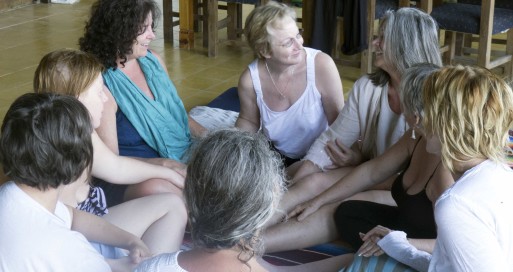
Credit: eventbright.com
It’s tremendously difficult to find for a client an environment in which they can show up how they are, in all their complexity, without the politicization that says either, “Get over it; you did the right thing,” or “You’ve really messed up and now you need to hold signs with us.” I think it’s really tragic, and a huge cost on the well being of many people. It’s hard to stay silent about something so meaningful and so tender.
Juniper: Do you have any comments regarding the services and objectives of Motheroots that we have not yet covered?
Gaby: I want to go back to the infertility aspect, which is another silent suffering that many people endure. After loss or during a period of infertility, there is a tendency to compare oneself to others of the same age group, with growing families, and think, “Why is that not me?” There tends to be ambivalence about parenting, and a lot of value-laden judgement and isolation that doesn’t allow us to be our best selves. It’s tremendously difficult, and the more we can all speak to each other about our actual experiences — when someone is courageous enough to say in a yoga class or woman’s group that they had a stillbirth or struggles with infertility — people come out of the woodwork and with similar stories, and there is less isolation when that happens.
Both Laurie and I are committed to breaking down those barriers that say “This is how the world is, and if I don’t fit in because of my choices or physical capacity, then I’m wrong and need to change.” I don’t think that perspective serves us as human beings.
Juniper: Thank you, Gaby, for this insightful conversation, and the important work you do!
Gaby: Thank you!

 Can Counseling Help Heal Childhood Trauma, Grief and Loss? An Interview with Gaby Donnell
Can Counseling Help Heal Childhood Trauma, Grief and Loss? An Interview with Gaby Donnell


 “Hand to Earth” by Andy Goldsworthy
“Hand to Earth” by Andy Goldsworthy
 Trans Remembrance Project Provides a Community of Grieving
Trans Remembrance Project Provides a Community of Grieving
 Caring for a Dying Loved One? Be Gentle With Yourself.
Caring for a Dying Loved One? Be Gentle With Yourself.














